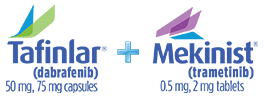Side Effect Management
TAFINLAR + MEKINIST
Tips for managing potential side effects
As with many medications, you may experience possible side effects while taking TAFINLAR + MEKINIST. Talk to your health care provider right away if you experience any side effects. Your health care provider may choose to modify, interrupt, or discontinue your dosage.
Tips for side effect management: |
Keep track of your side effects, and inform your health care provider about any side effect that bothers you or that does not go away
If you experience side effects, your health care provider may decide to adjust your dose or stop TAFINLAR and/or MEKINIST
Do not change your dose or stop TAFINLAR or MEKINIST unless your health care provider tells you to do so
Common side effects of TAFINLAR and MEKINIST in people with NSCLC include:
Fever
Tiredness
Nausea
Vomiting
Diarrhea (call your health care provider if you get severe diarrhea)
Dry skin
Decreased appetite
Rash
Swelling of the face, arms, and legs
Chills
Bleeding
Cough
Shortness of breath
Taking TAFINLAR + MEKINIST may cause serious side effects, including:
New skin cancers, including cutaneous squamous cell carcinoma, keratoacanthoma, basal cell carcinoma, or melanoma
Bleeding problems
Inflammation of the intestines, or tears (perforation) of the stomach or intestines
Blood clots
Heart problems, including heart failure
Eye problems
Lung or breathing problems
Fever
Serious skin reactions
Increased blood sugar (hyperglycemia)
New or worsening high blood pressure (hypertension)
Healthy red blood cells to break down too early in people with glucose-6-phosphate dehydrogenase deficiency
May increase the risk of a type of overactivity of the immune system (hemophagocytic lymphohistiocytosis) that can cause fever, swollen glands, bruising, or skin rash
Fertility problems
Low sperm counts
How your health care provider may help you manage fever: |
Fever is a common side effect of TAFINLAR + MEKINIST combination therapy, but it may also be serious. When taking TAFINLAR + MEKINIST, fever may occur frequently or may be severe. In some cases, chills or shaking chills, too much fluid loss (called “dehydration”), low blood pressure, dizziness, or kidney problems can occur with the fever. As soon as you start feeling unusually warm or cold, check your temperature. Call your health care provider right away if you get a fever while taking TAFINLAR + MEKINIST. Your health care provider may temporarily or permanently stop your treatment, or change your dose of TAFINLAR with MEKINIST if you have fevers. Your health care provider will treat you as needed for your fever and any signs and symptoms of infection, and should check your kidney function during and after you have had severe fever.
Drink liquids (for example: water, soups, ice pops) to prevent dehydration
Get plenty of rest
Place a cold cloth on your forehead if you feel hot
Use over-the-counter anti-fever medicines such as acetaminophen or ibuprofen as needed according to your health care provider’s instructions
What to do if you think you may have a fever on treatment
As soon as you start feeling unusually warm or cold, check your temperature. If your thermometer reads 100.4 ºF or higher, contact your health care provider. They may tell you to permanently stop or temporarily pause your treatment with TAFINLAR + MEKINIST at their discretion.
Tips for managing fevers
Tips your health care provider may suggest for managing other common side effects
Tips for managing rash: | |
Your health care provider may give you a range of recommendations, from limiting exposure to the sun to using a gentle, thick, alcohol-free emollient cream to soothe affected areas. In some cases these rashes and other skin reactions can be severe, and may need to be treated in a hospital. | |
Tips for joint aches: | |
Your health care provider may suggest over-the-counter nonsteroidal anti-inflammatory drugs to help relieve pain and swelling, along with icing and resting the affected area. | |
Tips for diarrhea: | |
Your health care provider may recommend a specific diet plan along with an increase in fluids and a decrease in greasy food, spicy foods, or foods containing dairy. In serious cases, diarrhea could be a sign of perforations of the stomach or intestines that can lead to death. |





